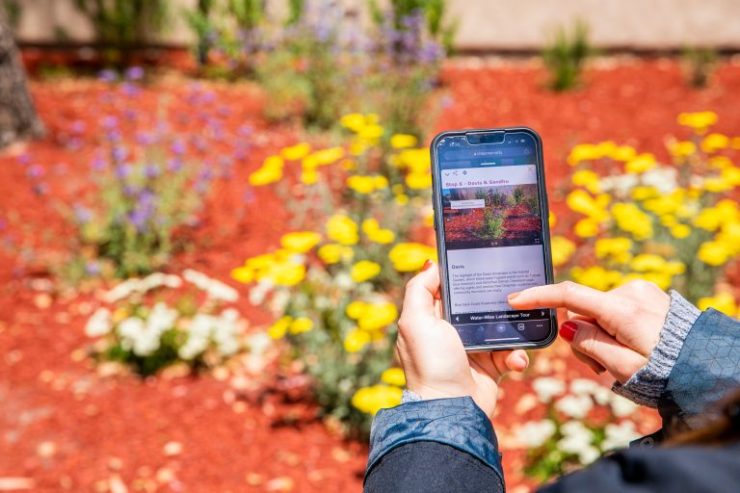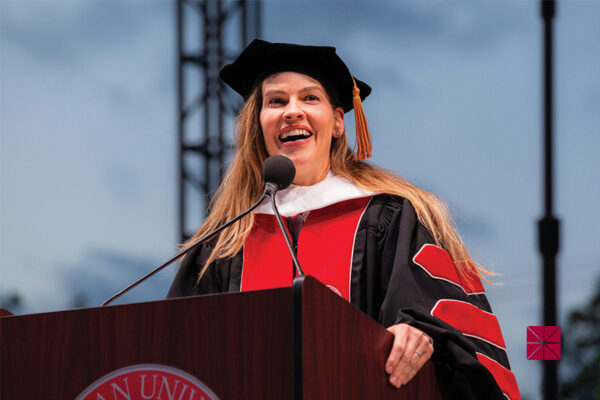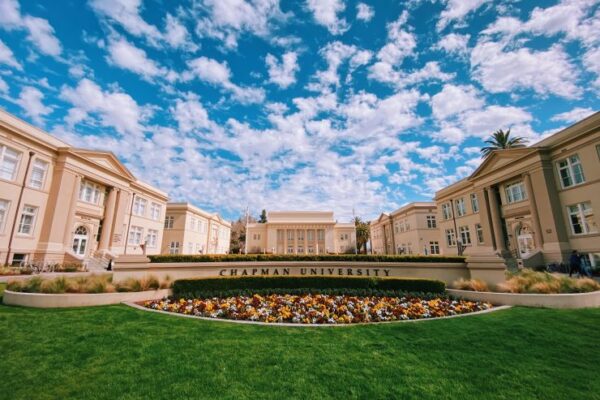Chapman University’s recently launched initiative, the Water-Wise Landscape Tour, showcases a stunning array of plants and pollinators that enrich the Chapman experience and highlight the university’s continued commitment to sustainable gardening practices and water-conservation stewardship to the community.
By the end of this academic year alone, 25,369 square feet of grass on the main campus in Orange have been converted to drought-tolerant landscaping, resulting in an estimated annual water savings of 712,362 gallons.
“No matter which side of campus you enter, and no matter where you’re walking on campus, you’re going to see beauty in the fulfillment of the university’s efforts to reduce our use of irrigation water,” said Jenny Kaufman, manager of energy conservation and sustainability at Chapman.
The Water-Wise Landscape Tour, set against the backdrop of Chapman University’s picturesque campus, invites visitors, students, and members of the community to explore the diverse drought-tolerant landscaping through signage with QR codes that link to images and information about the drought-tolerant landscaping flourishing throughout the campus. This project aligns with Chapman University’s commitment to fostering sustainability and stewardship of the environment. It also supports the university’s broader commitment to sustainability and its ongoing efforts to reduce water consumption and promote environmentally responsible practices.
The April 28 launch of the Water-Wise Landscape Tour culminated the latest phase of Chapman’s commitment to water conservation. That effort, which began in 2014, includes:
- Introducing drip irrigation to non-turf landscape areas
- Retrofitting sprinklers with low-flow nozzles in recreational turf location
- Adding more than 4,100 square feet of artificial turf to Residence Life areas
- Replacing water-intensive plants with drought-tolerant landscaping throughout the campus
- Educating students and others about opportunities to reduce personal water use
The self-guided trail encompasses various garden areas on the campus. Campus visitors, including nearby residents and dog-walkers, are guided through vibrant garden areas bursting with drought-tolerant plants, native species, and specially designed pollinator habitats. These gardens have been thoughtfully curated to showcase how beauty and sustainability can coexist, offering inspiration and practical ideas for individuals interested in adopting similar practices in their own homes and communities.
Going forward, Chapman will continue to identify opportunities to convert landscaping on the main campus in Orange as well as at the Rinker Health Science Campus in Irvine. The university does so even as it recognizes the need to preserve some grassy areas that serve the recreational needs of students.
About Chapman University
Founded in 1861, Chapman University is a nationally ranked private university located in Southern California. Chapman is categorized by the Carnegie Classification as an R2 “high research activity” institution and offers personalized education to more than 9,000 undergraduate and graduate students. The campus has produced a Rhodes Scholar, been named a top producer of Fulbright Scholars, and hosts a chapter of Phi Beta Kappa, the nation’s oldest and most prestigious honor society. Based in the City of Orange, Chapman also includes the Harry and Diane Rinker Health Science Campus in Irvine. In 2019, the university opened its 11th college, Dale E. and Sarah Ann Fowler School of Engineering, in its newest facility, Keck Center for Science and Engineering. Learn more about Chapman University: www.chapman.edu.
###




